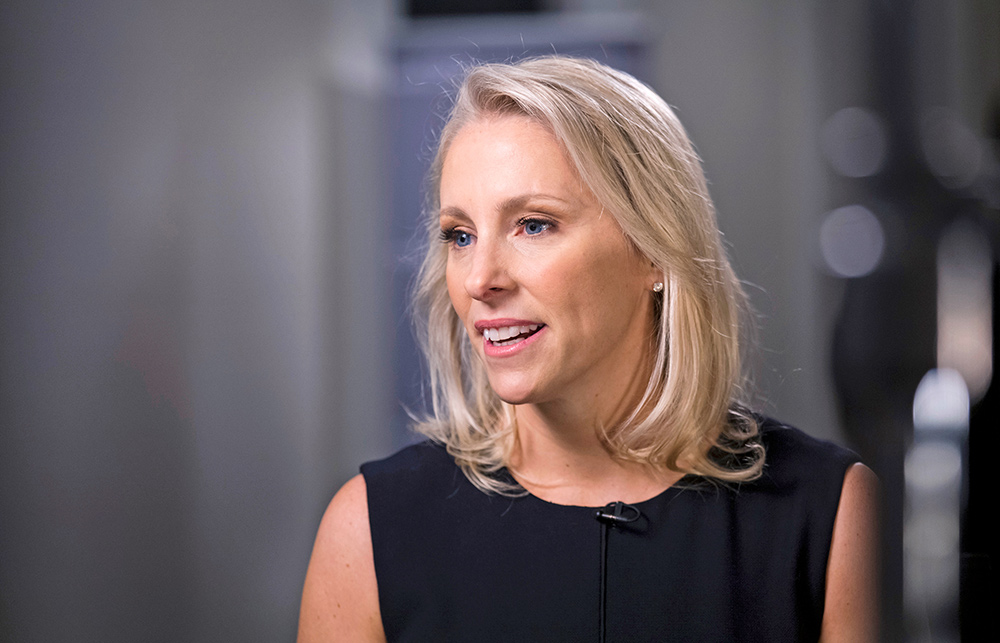
克里斯汀·佩克在今年1月担任动物保健公司硕腾(Zoetis)的CEO。当时,由于宠物消费稳步增长,因此公司发展迅速。但几周后,新冠疫情爆发,各国的封锁令使全球经济发生了天翻地覆的变化。然而,封锁令使美国领养宠物的人数创下历史纪录,这也让硕腾和佩克在面临第一次重大危机的时候,搭上了所谓的“顺风潮”。
硕腾于2013年从辉瑞(Pfizer)剥离,2019年进入《财富》美国500强榜单。硕腾主要生产宠物药品、疫苗等产品。硕腾是全球最大的“伴侣”动物保健公司,占有22%的市场份额,在其他多个牲畜市场同样遥遥领先。到目前为止,疫情对于商业牲畜或宠物消费的影响微乎其微,因此硕腾的业务表现相对良好。今年硕腾的股价下跌约5%,而标普500指数的跌幅超过9%。
联博集团(AllianceBernstein)聚焦美国增长公司的首席投资官詹姆斯·蒂尔尼表示,该制药公司的“业务多样化程度非常高。”其伴侣动物和牲畜产品基本各占50%,美国业务和国际业务的销售额也是各占一半。蒂尔尼表示,不同于许多人用药品公司,硕腾并不依赖拳头产品。硕腾的畅销产品犬类止痒药爱波克(Apoquel),2019年在公司63亿美元总销售收入中的占比不足10%。
佩克在康涅狄格州长大,她的成长过程中一直有动物陪伴(她回忆说:“我们养了马,四条狗,两只猫,还有鸟。”),曾在辉瑞担任高管,后来加入硕腾并带领公司完成了首次公开募股。她正在通过增加宠物用品广告和建立兽医远程医疗合作伙伴,适应新的现实。

佩克说在疫情期间出现的新宠物主人“参与方式截然不同”:她说,他们大部分是数字优先的千禧一代,在购买商品之前更有可能进行大量搜索。这已经增加了硕腾一些特种用品的销量,比如皮肤病药品(Apoquel和Cytopoint)以及宠物止痛药Rimadyl等。还有一款产品有望带来数亿美元销售收入:针对犬类跳蚤、蜱虫和心丝虫病的新药Simparica Trio,这是目前美国唯一一款组合药物。
与宠物消费一样,硕腾也不可能完全不受经济衰退的影响,公司最近也下调了今年的增长预期。在疫情期间,硕腾的牲畜业务面临着短期挑战,尤其是在牛肉和乳制品领域,农场关闭造成了供应链问题,牛肉加工业务中断也带来了困扰,甚至导致一些动物被实施安乐死。但佩克表示,她并不认为新冠疫情会抑制人们增加蛋白质摄入的长期趋势。但如果经济萧条导致消费者偏爱更廉价的肉,硕腾可以靠其他产品创造效益,比如一种可以取代抗生素的鸡饲料添加剂Zoamix。这款产品再次证明了硕腾业务的多样性。(财富中文网)
本文另一版本登载于《财富》杂志2020年6月/7月刊,标题为《硕腾CEO带领公司在疫情期间继续增长》。
译者:Biz
克里斯汀·佩克在今年1月担任动物保健公司硕腾(Zoetis)的CEO。当时,由于宠物消费稳步增长,因此公司发展迅速。但几周后,新冠疫情爆发,各国的封锁令使全球经济发生了天翻地覆的变化。然而,封锁令使美国领养宠物的人数创下历史纪录,这也让硕腾和佩克在面临第一次重大危机的时候,搭上了所谓的“顺风潮”。
硕腾于2013年从辉瑞(Pfizer)剥离,2019年进入《财富》美国500强榜单。硕腾主要生产宠物药品、疫苗等产品。硕腾是全球最大的“伴侣”动物保健公司,占有22%的市场份额,在其他多个牲畜市场同样遥遥领先。到目前为止,疫情对于商业牲畜或宠物消费的影响微乎其微,因此硕腾的业务表现相对良好。今年硕腾的股价下跌约5%,而标普500指数的跌幅超过9%。
联博集团(AllianceBernstein)聚焦美国增长公司的首席投资官詹姆斯·蒂尔尼表示,该制药公司的“业务多样化程度非常高。”其伴侣动物和牲畜产品基本各占50%,美国业务和国际业务的销售额也是各占一半。蒂尔尼表示,不同于许多人用药品公司,硕腾并不依赖拳头产品。硕腾的畅销产品犬类止痒药爱波克(Apoquel),2019年在公司63亿美元总销售收入中的占比不足10%。
佩克在康涅狄格州长大,她的成长过程中一直有动物陪伴(她回忆说:“我们养了马,四条狗,两只猫,还有鸟。”),曾在辉瑞担任高管,后来加入硕腾并带领公司完成了首次公开募股。她正在通过增加宠物用品广告和建立兽医远程医疗合作伙伴,适应新的现实。
佩克说在疫情期间出现的新宠物主人“参与方式截然不同”:她说,他们大部分是数字优先的千禧一代,在购买商品之前更有可能进行大量搜索。这已经增加了硕腾一些特种用品的销量,比如皮肤病药品(Apoquel和Cytopoint)以及宠物止痛药Rimadyl等。还有一款产品有望带来数亿美元销售收入:针对犬类跳蚤、蜱虫和心丝虫病的新药Simparica Trio,这是目前美国唯一一款组合药物。
与宠物消费一样,硕腾也不可能完全不受经济衰退的影响,公司最近也下调了今年的增长预期。在疫情期间,硕腾的牲畜业务面临着短期挑战,尤其是在牛肉和乳制品领域,农场关闭造成了供应链问题,牛肉加工业务中断也带来了困扰,甚至导致一些动物被实施安乐死。但佩克表示,她并不认为新冠疫情会抑制人们增加蛋白质摄入的长期趋势。但如果经济萧条导致消费者偏爱更廉价的肉,硕腾可以靠其他产品创造效益,比如一种可以取代抗生素的鸡饲料添加剂Zoamix。这款产品再次证明了硕腾业务的多样性。(财富中文网)
本文另一版本登载于《财富》杂志2020年6月/7月刊,标题为《硕腾CEO带领公司在疫情期间继续增长》。
译者:Biz
When Kristin Peck became CEO of Zoetis in January, the animal health company was growing rapidly, thanks in part to steady growth in spending on pets. Just a few weeks later, coronavirus lockdowns turned the global economy upside down. But they also prompted Americans to adopt pets in record numbers, enabling Zoetis and Peck to face their first big crisis with what you might call a tailwind.
Zoetis, which makes medicines, vaccines, and other products, was spun off from Pfizer in 2013 and joined the Fortune 500 in 2019. It’s the market-share leader in “companion” animal health, with 22% of the market, and in several livestock categories too. With the pandemic doing only minor damage so far to commercial livestock or pet spending, Zoetis’s business has held up relatively well. The company’s stock is down roughly 5% this year, while the S&P 500 has fallen more than 9%.
The drugmaker has an “incredibly diversified business,” says James Tierney, chief investment officer of concentrated U.S. growth at AllianceBernstein. Its portfolio is split roughly 50/50 between companion and livestock, with about the same split between U.S. and international sales. And unlike many human drug companies, notes Tierney, it isn’t dependent on blockbusters. Zoetis’s bestselling product, dog itch medication Apoquel, generated less than 10% of its total sales of $6.3 billion in 2019.
Peck, who grew up in Connecticut around animals (“We had horses, four dogs, two cats, birds,” she recalls), was an executive at Pfizer before joining Zoetis to shepherd it through its IPO. She’s adjusting to the new reality in part by boosting advertising for pet products and building veterinary telemedicine partnerships.
Peck says the newly minted pet owners of the pandemic era “engage differently”: They’re largely digital-first millennials, she says, and are more likely to heavily research products before buying. That’s already giving a boost to some of Zoetis’s specialty products like its dermatology line (Apoquel and Cytopoint), as well as products for pet pain like Rimadyl. Another promising product expected to add hundreds of millions in sales: a new combination flea, tick, and heartworm medicine for dogs, Simparica Trio—currently the only such combo product available in the U.S.
Like pet spending itself, Zoetis isn’t entirely recession-proof, and the company recently lowered its growth forecasts for the year. Amid the pandemic, its livestock business faces short-term challenges, especially in beef and dairy, where supply chain problems involving plant closures and interrupted processing of beef have caused hardship, even leading to some animals getting euthanized. But Peck says she doubts the coronavirus will curb the long-term trend toward eating more protein. And if lean times lead consumers to focus on cheaper meats, Zoetis could benefit from products like Zoamix, an additive that takes the place of antibiotics in chicken feed—one more example of diversification feathering the company’s nest.
A version of this article appears in the June/July 2020 issue of Fortune with the headline “The CEO who keeps animal pharm growing”






